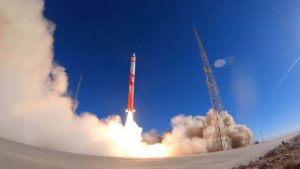
Chinese New Space satellite launch company LandSpace Technology announced on 20 November 2018 that it has received 300 million Yuan (U.S.$43 million) in a just-completed Series B funding round, according to Chinese news platform Weixin.
The U.S.$43 million funding round was led by Huachuang Capital along with Zhongyi Investment, Xidian Tianlang Venture Capital (Juzhuo Capital), 36氪 Fund and Investment, Goldwind Technology, Creative Angel, Zhongtian Century, and other established shareholders in the company, according to Weixin.
Huachuang Capital is one of China’s top investment institutions, providing entrepreneurs with venture capital investment in the initial stages of the startups it backs and is focused on the Chinese market. Since its inception in 2006, Huachuang Capital has focused on early investments in new finance, new industries, and new consumer sectors, and has leveraged its deep resources and experience to help its companies invest in strategic planning, business development, and team formation. Huachuang Capital is a top investment institution in China’s financial technology field, enterprise software and services, and one of the leading angel investment institutions in China.
The Series B funding means that LandSpace has received a total of 800 million Yuan (U.S.$115 million) in investments since its founding in 2015, putting it on a par with Chinese rival OneSpace as the best funded New Space launch company in China.
This round of financing will be mainly used for the research and development of the company’s liquid oxygen-methane engine Tianjin (TQ-12) and its medium-sized liquid-fueled satellite launch vehicle Zhuque-2 (ZQ-2) and its supporting infrastructure. LandSpace aims to create a new commercial aerospace ecosystem in China by establishing the independent development, production, and testing of satellite launch vehicles.
At present, the Tianjin liquid oxygen-methane engine completed its short-nozzle state thrust chamber test at the end of September 2018. It is expected that the whole system test will be completed in the first half of 2019. The Zhuque-2 launch vehicle based on this engine is scheduled to carry out its maiden launch in 2020.
LandSpace has already attempted to become the first privately own Chinese space company to loft a launch vehicle into orbit. LandSpace’s Zhuque-1 was launched from the Jiuquan Satellite Launch Centre in Northwest China on 27 October 2018, but the orbital attempt failed after an unsuccessful third stage engine firing.
Zhuque-2 is a proposed medium-sized launch vehicle powered by liquid oxygen and methane engines capable of lifting 4,000 kilograms of payload into a 200 kilometre low Earth orbit, or 2,000 kg of payload into a 500 km Sun-synchronous orbit. As of July 2018, Zhuque-2 was planned to be launched in 2020.
LandSpace, known in Mandarin as Blue Arrow Space Technology Co. Ltd., was founded in 2015 by Tsinghua University, and is one of a growing number of competitors in China’s intensifying New Space satellite launch sector.





